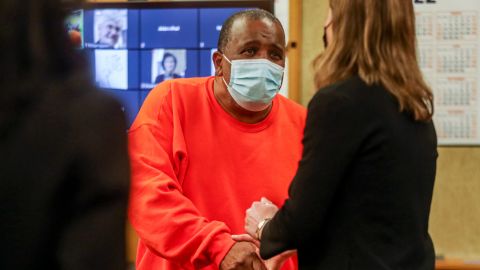
Analysis: What critics of progressive prosecution get wrong about crime spikes and the reform movement


Washington CNN —
Joaquin Ciria knows firsthand the power of the so-called progressive prosecutor movement, which seeks to make the US criminal legal system less harsh and more ethical.
In 1991, he was convicted of first-degree murder for the shooting death of his friend, Felix Bastarrica. Despite flaws in the case against Ciria – including the fact that the jury never heard from alibi witnesses – the Black 29-year-old was sentenced to 31 years to life in prison.
Ciria wasn’t released until April of this year. His salvation was an investigation by the San Francisco District Attorney’s Innocence Commission – a group of experts working to revisit claims of wrongful conviction. If a majority votes to vacate the conviction, the group takes its findings to the DA, who makes the final decision. The DA who secured Ciria’s release: Chesa Boudin.
Ciria, now 61, holds a tremendous amount of reverence for Boudin, who in June was booted out of office in a historic, widely-watched recall election.
“He’s not afraid,” Ciria told CNN, referring to Boudin. “He don’t play politics with people’s lives.”

At a time when fears about crime have prompted intense political scrutiny of Boudin and other progressive prosecutors – last week, Republicans in the Pennsylvania House of Representatives filed articles of impeachment against Larry Krasner, asserting that the Philadelphia DA’s policies are a threat to public safety – some have argued that the former San Francisco DA’s recall illustrates that the movement is out of touch with voters’ concerns.
But the claim that reform-minded prosecutors’ approach is fueling violent crime is false, per recent research. Further, some experts say, to focus overmuch on Boudin’s fate is to disregard progressive prosecutors who are successfully plowing ahead with ambitious agendas as midterm elections loom – and even to diminish the value of efforts to reshape a system that disproportionately disadvantages people of color.
“Less punitive prosecutors are a form of harm reduction, not the solution,” the legal observer Josie Duffy Rice noted earlier this year. “The paradox of prosecutors is this – they have the power to cause a lot of problems, but not enough power to solve them.”
She added, “Prosecutors are still prosecutors. But having someone in office who practices some level of restraint is necessary. It will not fix deeper-rooted problems in San Francisco or anywhere. That’s not the job. But it will reduce harm.”
Speaking with CNN, James Forman Jr., a Yale University law professor and the author of the Pulitzer Prize-winning 2017 book, “Locking Up Our Own: Crime and Punishment in Black America,” echoed some of Rice’s sentiments.
“For most of my lifetime, the only way you became a prosecutor was by saying that you were going to lock up more people – and for longer and in worse conditions – than your opponent,” said Forman, who used to be a public defender. “The idea that there’s a new generation of people who are saying things like, ‘Let’s talk about decriminalizing low-level offenses. Let’s talk about restorative justice. Let’s ask ourselves if a long prison sentence is justified in all of these cases. Let’s look at old convictions to see if they were obtained using false information’ – we need people asking these questions throughout the system. And one place we need them is in the prosecutor’s office.”
As the country prepares for key DA races – including in San Francisco, Arizona’s Maricopa County (Phoenix) and Minnesota’s Hennepin County (Minneapolis) – reformist prosecutors and their supporters insist that the movement to rethink the criminal legal system must continue.
The freedom of people like Ciria may depend on it.
While some argue that Boudin’s recall spells doom for progressive prosecutors elsewhere, such predictions might be rash.
For one thing, a number of factors made the election somewhat unique and, in consequence, difficult to draw sweeping conclusions from.
“Boudin clearly struggled as a politician, including at one point saying that a person had committed murder during what appeared to be a ‘temper tantrum.’ And unlike normal elections, recalls do not pit two candidates against each other, and thus may reflect people’s views of the person more than their policies,” the Fordham University law professor John Pfaff wrote for Slate in July.
He continued, “Not to mention that it is risky to draw big conclusions from low-turnout elections, something even those pushing a bigger narrative concede. And San Francisco voters were wary of Boudin from the start: By the end of the city’s ranked choice voting process in 2019, he barely won, edging out the much more moderate Suzy Loftus 50.8 percent to 49.2 percent.”
Plus, though some progressive prosecutors are embattled – remember the campaign against Krasner, or the backlash from certain quarters against Manhattan DA Alvin Bragg – others are experiencing success.
For instance, in August, in Chittenden County – Vermont’s most populous county – the reformer Sarah George prevailed in her primary. In Contra Costa, California, the progressive-leaning DA Diana Becton won reelection in June. And the month before, in Durham, North Carolina, the reformer Satana Deberry handily won her primary.
Boudin summarized why his recall wasn’t a meaningful bellwether moment.
“Since my recall, there have been (at least) three major successes for the criminal legal reform movement,” he told CNN. “One, the failure of the recall against (the Los Angeles County DA) George Gascón. Two, the reelection of Sarah George in Vermont. And three, the ouster of an extremely conservative, reactionary, 10-year incumbent in Tennessee (Amy Weirich) by a progressive reform Democrat (Steve Mulroy).”
Like the former San Francisco DA, George is “really optimistic” about the future of progressive prosecution.
“Around the same time that Chesa’s recall was successful, there were other progressive DAs in California up for reelection against more tough-on-crime people. They won,” she told CNN. “So, I feel really good about the movement. I think that it’s definitely growing.”
Experts CNN spoke with say that, in the run-up to the midterm elections, it’s important not to lose sight of the fundamental value of attempts to reimagine the country’s criminal legal system.
“It’s hard to find people anymore who haven’t been impacted by our legal system, who haven’t seen up close the ways it doesn’t work,” Miriam Krinsky, the executive director of the group Fair and Just Prosecution, told CNN. “They’ve seen it affect a loved one or a friend or a colleague or a neighbor or some other member of their circle.”
She paid special attention to the fact that the traditional tough-on-crime approach disproportionately burdens people of color.
“We know that racial disparities are present at every stage of the criminal system: who gets stopped, who gets arrested, what their treatment is post-arrest, who gets prosecuted, for how long they end up behind bars and, in the most extreme cases, for whom the death penalty is sought and when it’s imposed,” Krinsky added.
Lara Bazelon, a law professor at the University of San Francisco and the chair of the Innocence Commission, put some of these sentiments a little bit more bluntly.
“Before the commission existed, no DA in San Francisco’s history had ever agreed to exonerate anyone,” she told CNN. “Instead, they fought tooth and nail to keep innocent people locked up – which is absolutely shameful, particularly in a city that says that it’s progressive.”
Bazelon went on, “I don’t believe that going back to the days of tough on crime is going to make us safe. And I think that there are stacks and stacks of academic and empirical studies that prove that point.”
It’s worth reiterating that progressive prosecution is no panacea for crime.
“There’s no single thing that’s going to undo 50 years of harshness built across 50 states and 3,000 counties and every single institution in our criminal system,” Forman, the Yale law professor, said.
In short, pushback must come from every quarter: judges who won’t lock up people merely because they’re poor, legislatures that are prepared to revisit long sentences for a wide range of offenses, public defender’s offices that receive more money, prosecutor’s offices that take a progressive approach to the law.
Forman explained that, in the future, he’d like to see progressive prosecutors commit to shrinking the size and scope of their offices – because if they’re successful, they’re going to find ways to reduce crime that don’t rely on policing and prison.
“I actually think that victory will be when they’re not needed,” he said. “Now, we know that such a world is probably never going to exist, because every country in the world for all of history has had crimes. But if we set that as a goal, as a dream, we can measure success by whether we’re taking steps in that direction.”
Source: https://www.cnn.com/2022/11/06/us/progressive-prosecution-midterms-reaj/index.html
















